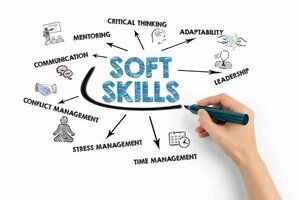3 Essential Skills Teens Need Before AI Takes Over (2025 Guide)
Discover the top skills teens need to thrive in an AI-driven world. Learn how critical thinking, communication, and adaptability can future-proof their careers.

The Essential Job Skills Every Teen Needs in the Age of AI
As artificial intelligence transforms the workplace, parents and educators face a pressing question: What job skills should teens master now to thrive in a future where AI is ubiquitous? The answer extends far beyond technical aptitude. Experts emphasize that while AI excels at routine tasks, human skills like critical thinking, communication, and adaptability will become even more valuable. This article explores the core competencies teens need, why they matter, and how parents can help cultivate them.
The Changing Landscape of Work
The workforce is undergoing a seismic shift. Automation and AI are replacing many routine jobs, but they also create demand for roles that require creativity, emotional intelligence, and complex problem-solving. Meanwhile, fewer teens are gaining real-world work experience—today, less than half of Americans aged 16–24 are employed, a sharp decline from previous generations. This gap means many young people miss out on formative lessons in responsibility, punctuality, and teamwork that come from early jobs.
The stakes are high: Teens who lack these skills risk falling behind as entry-level opportunities evolve. Employers increasingly seek candidates who can collaborate, adapt, and think critically—qualities that AI cannot easily replicate.
Three Job Skills Every Teen Needs
1. Critical Thinking and Problem-Solving
Critical thinking—the ability to analyze information, weigh options, and make reasoned decisions—is a cornerstone of future employability. In a world flooded with data and misinformation, teens must learn to question assumptions, evaluate sources, and solve problems creatively. These skills are vital not only in STEM fields but also in law, healthcare, education, and the arts.
How parents can help: Encourage teens to tackle real-world problems, whether through school projects, internships, or part-time jobs. Discuss news stories, debate ethical dilemmas, and model thoughtful decision-making at home. Documenting achievements and reflecting on challenges can also help teens articulate their problem-solving abilities to future employers.
2. Communication and Collaboration
Effective communication—both verbal and written—is essential in every profession. Teens must learn to express ideas clearly, listen actively, and work well in teams. With remote work and global teams becoming the norm, digital literacy and the ability to collaborate across platforms are equally important.
How parents can help: Practice phone calls, emails, and face-to-face conversations at home. Encourage participation in group projects, clubs, or volunteer work. Internships and part-time jobs in customer service or tutoring provide hands-on experience with professional communication. Teens should also learn to adapt their communication style to different audiences, a skill that becomes even more critical as workplaces diversify.
3. Adaptability and Lifelong Learning
Adaptability—the capacity to adjust to new situations, learn new skills, and embrace change—is perhaps the most crucial skill for the AI era. Industries evolve rapidly, and the jobs of tomorrow may not exist today. Teens who cultivate a growth mindset and a love of learning will be best positioned to navigate uncertainty.
How parents can help: Expose teens to diverse experiences, from coding camps to arts programs. Encourage curiosity and experimentation. Help them set realistic goals and celebrate effort as much as achievement. Discuss the importance of resilience and the value of learning from failure.
Beyond the Big Three: Essential Life Skills
While critical thinking, communication, and adaptability are paramount, several foundational life skills underpin professional success:
- Time management and organization: Balancing school, work, and personal life teaches prioritization and discipline—skills that are in high demand but often underdeveloped in teens.
- Financial literacy: Understanding budgeting, saving, and responsible spending prepares teens for independence and reduces financial stress in adulthood.
- Basic workplace etiquette: Showing up on time, respecting authority, and staying on task—even when work is tedious—are baseline expectations in any job.
- Technical and digital literacy: While not every teen needs to code, comfort with technology and the ability to learn new tools are non-negotiable in most careers.
Practical Pathways to Skill Development
Parents play a pivotal role, but teens also benefit from real-world experiences:
- Part-time jobs and internships: Roles in retail, tutoring, customer service, or administrative support teach responsibility, communication, and problem-solving.
- Volunteering and extracurriculars: Leadership in clubs, sports, or community service builds teamwork and initiative.
- Career exploration: Tools like the Agile Work Profiler and Occupation Explorer help teens identify their strengths and explore career paths aligned with their interests and the job market’s needs.
- Mentorship and feedback: Regular check-ins with supervisors or mentors provide guidance and help teens refine their skills.
The Broader Context: Preparing for an Uncertain Future
The transition to an AI-driven economy is not just a technical challenge—it’s a cultural and educational one. Schools and families must work together to ensure teens develop both hard and soft skills. While test scores and academic knowledge remain important, employers increasingly value conscientiousness, resilience, and the ability to learn continuously.
The bottom line: Teens who master critical thinking, communication, and adaptability—and who build a strong foundation of life skills—will be well-equipped to succeed, no matter how the job market evolves.
Visualizing the Skills
While no single image encapsulates all these competencies, infographics or diagrams that map “future-proof skills” (critical thinking, communication, adaptability) alongside foundational life skills (time management, financial literacy, digital literacy) would be highly relevant. Look for visuals that show teens engaged in collaborative projects, problem-solving activities, or using technology in creative ways—images that go beyond generic “teen with laptop” stock photos to illustrate active skill-building.
Conclusion
The rise of AI does not spell the end of human work, but it does demand a new emphasis on uniquely human skills. Parents who focus on fostering critical thinking, communication, and adaptability—alongside practical life skills—are giving their teens the best possible preparation for the careers of tomorrow. In a world of constant change, these competencies are the ultimate insurance policy for future success.



